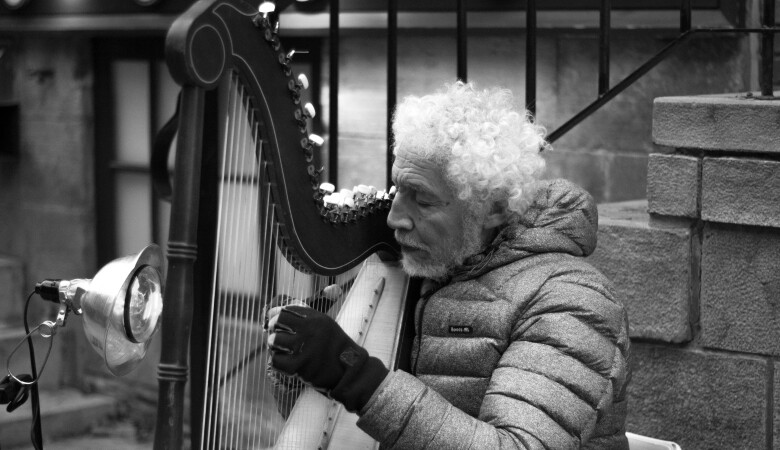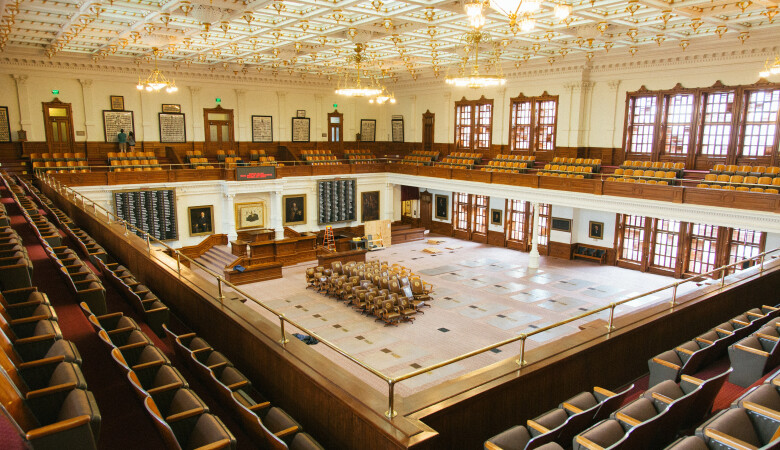Heart Righteousness or Hypocrisy: Good Deeds Sifted (Matthew Sermon 15 of 151)
May 09, 1999 | Andy Davis
Matthew 6:1-21
Holiness
I. What is a Hypocrite?
What is a hypocrite? The word actually comes from the ancient Greek, and it means an actor - somebody who acts for a profession. In other words in ancient Greece, a performer would get dressed up in a costume, hold a mask in front of this or her face, and would play a role. These kind of plays were very popular in ancient Greece. Oftentimes, the acting troops were small and one person had to play several different roles. You'd always know which role was being played by which mask was being held up in front of the actor's face. So, to an ancient Greek, a hypocrite was an actor who played something that they really weren't.
To a lot of non-Christians here in America, a hypocrite is somebody who goes to church. Have you ever dealt with that before? If you go to church, you're a hypocrite. Or if, for example, you believe that there's such a thing as absolute truth, or if you believe that your sins have been forgiven through faith in Jesus Christ, or if you hold to a standard and desire to live a righteous life, to some people, you're a hypocrite. In the dictionary, a hypocrite is a person who fakes beliefs or feelings or virtues that one does not truly possess. But to Jesus Christ, a hypocrite is somebody who outwardly goes through the motions of love for God or love for neighbor, but their heart is actually far from God and far from their neighbor. It says in Matthew 15:7, "These people honor me with their lips, but their hearts are far from me." This, to Jesus, is a hypocrite.
In this day and age, this modern technological society we live in, reality, and truth, and that which is just an illusion is getting harder and harder to differentiate. I saw recently on PBS a program about the use of computers in making films in which it was noted that in the popular movie, Titanic, a lot of the scenes in which there are large crowds in the boat waving are all computer-generated people. They weren't real people. They got a couple of actors or actresses to do the motions, and then they worked it into the film by computer. You might wonder why they didn't have more closeups - apparently the technology is not good enough yet to get hair right. Once they get that problem solved, do you know what they think will happen? There will be a computer-generated actor or actress who doesn't exist at all. You'll go to see movies this person is in , and you might even write them fan mail or say that he's my favorite actor, and he doesn't even exist. Isn't that a little bit strange? That may be 10, 15 years down the road, but it's coming and they may not even tell you. Won't you feel foolish when you find out there wasn't even a human being behind it, it's all computers? I don't really know if we're actually heading to that, but that's something that people are facing on the Internet. They'll interact with somebody and they can create a whole image of a life, and it's not even there.
Jesus says it’s a real issue with the church, namely that there be reality, there be truth behind what is presented, that people be truly members of the kingdom of heaven. In Matthew 6, Jesus turns a corner. In order to understand where we are, we have to look to where we've been. We've already been through the chapters on the Sermon on the Mount, and Jesus is talking about the kingdom of heaven. He's talking about what it's like to be in the kingdom of heaven. Remember, He begins with The Beatitudes, which is a series of heart characteristics of those who are truly in the kingdom of heaven, truly saved. Shall I say truly born again? He says the whole thing starts with being a spiritual beggar - Blessed are those who hunger and thirst for righteousness. As a beggar, you go into a hungering, a yearning for God. and that extends into every single thing you do. A spiritual beggar is hungry and thirsty, also merciful and kind to others because they know that they, themselves, are really in need of forgiveness from God. From that original set of characteristics, and Jesus moves on and begins to deal with the proper role of the law in the life of a Christian as we've seen in chapter 5. Remember Jesus said that unless your righteousness surpasses that of the Pharisees and teachers of the law, you'll certainly not enter the kingdom of heaven. He takes the law, and moves through a series of cases, a series of issues, in which He's dealing with the negative side of the law. The law had a negative and a positive side; the negative side is to restrain evil. It's a number of “thou shalt nots”: thou shalt not murder, thou shalt not commit adultery. thou shalt not steal, etcetera. So the law restrains evil. But remember what Jesus did? He takes the law and probes down deeper into the heart. He says, "Alright, you may not murder, but are you angry? You may not commit adultery, but is there lust in your heart?" and so on. Jesus is looking at the heart in terms of the restriction of evil.
II. Christian Piety in Religious Duties
In chapter six, we get to the positive side of the law. As well as restrictions, the law also encourages pious actions. It encourages giving, praying, and fasting, while asking , “What is your motive? What is your reason?" That's what's before us today as we look at these first 21 verses. The first three cases are all drawn together with a similar theme, namely that we should fight against hypocrisy, and make our righteous acts truly heart righteous. Listen now to Jesus' words in Matthew 6: 1-4, "Be careful not to do your acts of righteousness before men, to be seen by them. If you do, you will have no reward from your Father in Heaven. So when you give to the needy, do not announce it with trumpets as the hypocrites do in the synagogues and on the streets to be honored by men. I tell you the truth, they have received their reward in full. But when you give to the needy, do not let your left hand know what your right hand is doing so that your giving may be in secret. Then your Father who sees what is done in secret will reward you. And when you pray, do not be like the hypocrites, for they love to pray standing in the synagogues and on the street corners, to be honored by men. I tell you the truth, they have received their reward in full. But when you pray, go into your room, close the door, and pray to your Father who is unseen. Then your Father who sees what is done in secret will reward you." Skipping down to verse 16, "When you fast, do not look somber as the hypocrites do, for they disfigure their faces to show men they are fasting. Truly, I tell you they have received their reward in full. . . . Do not store up for yourself treasures on earth, where moths and vermin destroy, and where thieves break in and steal. But store up for yourselves treasures in Heaven, where moth and rust do not destroy, and where thieves do not break in and steal. For where your treasure is, there your heart will be also."
You may wonder why I included these last verses, verses 19, 20, and 21. Some think these verses teach only about materialism, but I think they actually knit the whole chapter together. This chapter is broken up into two sections. Verse 1 through 21 is Christian piety in religious duties, and the key principle we see right at the beginning, verse one, "Be careful not to do your acts of righteousness before others to be seen by them." Then Jesus bring us through these three case studies giving to the poor without hypocrisy, verses 2 through 4; praying without hypocrisy, verses 5 and 6; and then fasting without hypocrisy, verses 16 through 18. Then there's a transition set of verses, from 19 through 21, about storing up treasure in Heaven. Jesus then moves on to talk about Christian piety in freedom from materialism - being free from care about material wealth in verses 19 through 24; freedom from daily anxiety in verses 25 through 34; and then, in general, a freedom to live for Heaven and for God.
The danger of hypocrisy is a major theme in the beginning of chapter six. Right at the beginning Jesus says, "Be careful not to do your acts of righteousness before men to be seen by them. If you do, you will have no reward from your Father in Heaven." Jesus here is getting to the issue of motive. Why do you do what you do? Do you really know why you do what you do? Sometimes, I don't think we really do. Our hearts are so complex, aren't they? Our motivations, the things that move us, that, shall I say, manipulate us. What influences us? Do we really know? Jesus says there's something about which we need to be careful. So Jesus uses this kind of language: be careful, or be on guard, or be diligent, that you not do your acts of righteousness before men. He thinks this is a danger, a real problem for us, and He's speaking to people in the kingdom of heaven. People who are included in the kingdom of heaven have to be on their guard to purify their motives for everything they do. The danger here is the danger of hypocrisy. In other words, seeming to love God, seeming to love neighbor, but your real motive is something different. Like an actor, the outward appearance is very different from the true reality. Saint Augustine said, "The love of honor is the deadly bane of true piety. Other vices bring forth evil works, but this brings forth good works in an evil way." Do you see the danger when you're loving reputation, you're loving honor from other people? If your motives are anything but true heart relationship with God, then it's hypocrisy, and it's dangerous because it brings forth good deeds in an evil way. I think that behind idolatry, the worship of false gods, hypocrisy was the second most significant sin in Israel. They were a very religious people, constantly thinking about outward expressions of religion. And Jesus said, "You've got to get to the heart. What is your heart relationship with God, and is it right?"
Hypocrisy was not just a problem for Israel, but it's a problem for the church today, isn't it? Have any of you tried to share the Gospel with co-workers, with neighbors, with friends? Very soon, you'll run into the issue of hypocrites in the church. How many times have you heard about hypocrites in the church? Are there hypocrites in the church? Yes, there are. Are there hypocrites outside the church? Yes, there are. I think this is a great place to come and get cured of hypocrisy, and it's a passage just like this that'll do it. If you get somebody that'll preach the Word and talk to you honestly about it, maybe you can get cured of your hypocrisy. We all have it to some degree. I remember talking to a guy I used to work with who was so skeptical about religion and Christianity. He said, " The church is just full of hypocrites." I said to him, "What's a hypocrite?" He said, "Well, I don't know, I've never really thought about it." It's funny how he puts the label on the church, but he doesn't really know what he means. He said, "I don't know. I guess, a hypocrite is somebody who has a certain standard, but they don't live up to it." I said, "Well, what would you say are your standards for life? If you could make up five or 10 good rules for living, what would they be?" He said, "I don't know. I've never really thought about it." His was an unreflected life, not really thinking much about these things, but I forced him to it. So he was thinking about it, and he said, "Well, I started to make some rules and regulation." I said, “What you ought to do is just write them down. Write down five or 10 just and good rules for living. Get them from anywhere you want. And then just watch yourself over the course of the year, and see if you, yourself, live up to your own standards. Pretty soon you may join the rest of us ranks of hypocrites.” Nobody lives up to the standard that they espouse and they uphold.
III. Living for God’s Honor Rather Than Selfish Honor
But there is a deeper issue here of hypocrisy, isn't there? Hypocrisy in a Christian is somebody pretending to love God, but inside not loving God. That's a more dangerous issue. That's a case of somebody who, I don't know, walked the aisle or said some prayer at some point 20, 30 years ago, but there's really been no continuation from that point. There's no true love for God. As someone once said, "A life for Christ is far more significant than a decision for Christ." A true decision for Christ always leads to a life for Christ. We get to the issue here about the delicate balance in the Christian life. Didn't we just hear in Matthew 5:16, ”Let your light shine before men that they may see your good deeds and praise your Father who is in heaven." You're supposed to be doing your good deeds in front of everybody, so that they can see them. But here in Matthew 6: 1 it says, "Be careful not to do your acts of righteousness before men to be seen by them." Doesn't this seem like a contradiction? Well, what is it? Are we supposed to shine our light or are we supposed to not do our deeds before men to be seen by them? It's only a contradiction on the surface. The real issue has to do with why you do what you do. It has to do with motive. Look at the motive of Matthew 5:16. It says, "Let your light shine before men, so that they may see your good deeds... " and what? "And praise your Father in heaven." Who gets the honor or glory from those good deeds? Your Father in heaven.
But Matthew 6:1 is a different story - ”Be careful not to do your acts of righteousness before men in order to be seen by them," which reflects an entirely different motive. We're doing it for show, so that people can see and comment on what a good person we are. We see, therefore, that the contradiction is only on the surface. A.B. Bruce put it in perspective for us. He said, "If you just want to sort this thing out, this is what I'd recommend to you. Play off your temptations. Do the opposite of whatever you're tempted to do. When you're tempted to hide, show. When you're tempted to show, hide." You see? Satan's always working opposite to what God wants. God wants us to let our light shine. We're supposed to have an influence in society; we're supposed to preach the Gospel, but instead we pull in. We're cowardly, we're afraid. We never say a word about Jesus; we don't make any influence on society around. But do the opposite, when tempted to hide, show.
God Pleasing or People Pleasing
We hear people say, “He’s a man of prayer,” or “What a woman of God.” When you' see these people, you need to be careful. I love good encouragement, but it can be a dangerous thing, because all of a sudden your eyes get off glory for God, and you're starting to want that applause. You're starting to want the praise. So “play off your temptations,” says A.B.Bruce. As we look across this section, Christ is basically putting before us three choices: The first choice is this: pleasing self or pleasing God. Which is it going to be? Are we going to please ourselves or are we going to please God? Some might think that the choice here is actually a choice between pleasing men and pleasing God. A human audience, this kind of thing. But I don't think so. Why is it that we want to please people? Is it because we love people so much, and want them really to be happy? No. The reason we want to please people is so they'll be nice to us or think well of us or give us good things. It really comes back to self, doesn't it? That's why we become people pleasers, because it benefits us. It's not because we're so altruistic, thinking about others, wanting them to happy. It comes back to self. The difference between pleasing self and pleasing God. Actually, I think that whole thing of being tempted to hide when we should show or show, when we’re tempted to hide is just two sides of the same coin, isn't it? The reason we don't evangelize is we don't want people to think poorly of us. We don't want to be seen as a holy roller or something like that. And so we hide because of human reputation. The flip side also is true. We show before other people who will recognize our righteousness for the same reason, human reputation. It's two sides of the same coin. The issue here is are we going to please self or are we going to please God?
Present vs. Future Rewards
The second choice is, are we going to live for present or for future rewards. Which is it going to be? You have to choose. Are we going to live for present or future rewards. The issue of rewards seems somehow unchristian, doesn't it? We should just be willing to do what's right, just because it's right. Isn't that true? Doesn't that sound so holy? If that's the way we should think, then why does Jesus talk about rewards so much? Is it just a concession to our weakness? No. He's trying to shape our faith. He's trying to get us to think about what truly matters, the pleasure of God. We're going to talk more about rewards when we get to Matthew 6:19 through 21, but the truth is, Jesus is consistently laying rewards before us, isn't He? He's laying rewards that are eternal, that do not go away. Look what He says in Matthew 5:12, talking to the persecuted one. He says, "Rejoice and be glad, because," what? “great is your reward in heaven, for in the same way they persecuted the prophets who were before you.” Do you want a prophet's reward? Then stand up under persecution.
What is Jesus doing? Is he appealing to our weakness here, trying to tempt us like a tempter? No. He's saying you should want rewards, but you should want the right reward. Be willing to stand up under persecution. Matthew 5:46, "If you love those who love you," what does He say? "What reward will you get?" We should be concerned about rewards says Jesus. "If you do your work before men, you'll have no reward from your Father in heaven." The danger is you'll lose your reward. And again, in verse 2 and verse 5 and verse 16, He says three times, "Truly I say to you, they have received their reward in full." The real choice is not about reward or no reward. The real choice is do you want your reward here and now, or do you want it eternally? That's the choice you have to make.
Living before a Living God or not
The third choice is the choice between living constantly before an invisible God or not. Genesis 16:13 says, "You are the God who sees me." Meditate on that. Psalm 139:7 says, "Where can I go from Your spirit? Where I can flee from Your presence? If I say that the darkness will hide me, even the darkness is as light to You." God sees everything we do. And Jesus says three times, "Your Father who sees what is done in secret will reward you." On judgment day, when you stand before God, won't you want it to be the case that the things you did in secret were righteous things and not sinful things? God can see it all. So there's the choice. The choice is between living before an invisible God who sees everything you do or turning away from that and pretending that He doesn't see you.
IV. Alms Giving
Let's look more carefully at each of these cases. The first case is the case of alms giving or giving to the poor, giving without hypocrisy. The Jews believed that giving to the poor was the highest act of righteousness. As a matter of fact, they thought that if you gave money to the poor, it would pay for sin. Listen to Tobit 12:8. Tobit,an apocryphal book, written by Jews about 100 or 200 years before Jesus, says, [it is not Scripture by the way], "It is better to give to charity than to lay up gold, for charity will save a man from death. It will atone for any sin." Is that a biblical idea— that you can pay for your sins with money? Only one thing pays for sin, the blood of Jesus Christ. There is nothing else that pays for sin. I don't care how many good works that you do, they'll never pay for sin. The whole issue with good works is that God expected them all along anyway. There's no extra credit for doing what God expected, therefore you can't use your good deeds to pay for your sin. That's what the Jews believed. Listen to this Wisdom of Sirach another book of the Apocrypha. In the Wisdom of Sirach 3:30, "As water will quench a flaming fire, so charity or giving to the poor will atone for sin." Wrong, it does not, but that's what they believed. The Roman Catholic church bought into this idea. Pope Leo the Great said this, "By prayer, we seek to appease God; by fasting, we extinguish the lust of the flesh; and by alms giving, we redeem our sins. "Nothing can wash away sin, but the blood of Jesus Christ, but that's what they believed.
Back in Jesus' day, there were looking for more than just the forgiveness of sins though. They wanted something else. They wanted something here and now. So what did they do? They announced their alms giving with trumpets. "Everyone notice, I want you to know how much I'm giving. I am giving five dinari to this poor person. Did you see that? You see him, he's here every day, and I'm giving five dinari. Okay, everyone clap for me, very good," announces the trumpets. They're not just looking for forgiveness for sins, they're looking for something here and now. What is it they want here and now? They want respect, they want honor, they want somebody to say, "Oh, what a righteous man. What a generous person." That's what they want. I don't find anywhere an actual account from archaeology of people who announced giving with trumpets. I think Jesus is just using a figure of speech saying, "People who trumpets their righteousness." People who proclaim what good people they are. Are there any forms of modern trumpet blowing? We call it blowing your own trumpet today. I saw an example in a Christian magazine recently. You can give to a charity and they will send you a plaque, and they will put your name on the plaque and the amount that you gave and you can hang it up there on your wall. You know what I would say to you? Go ahead and hang it. Truly I say to you, you have received your reward in full. There's lots of modern trumpet blowing, but the deeper issue here is, do you really want it now? Do you want your reward now? You should say, "No, I don't want it now." I was with my daughter at an inner city ministry. There they have to motivate the children to get them to sit down and be quiet so that they an teach. You know how they motivated them? The gave candy awards to those that are sitting most quietly. My daughter happened to get a reward. We had been talking about rewards that week. She was looking at the candy bar, and we started talking about it. I said to her, “You have a choice. You can eat it now or you can eat it in heaven, which do you want to do?" She said, "I want to eat it in heaven." I said, "Well how can you do that?" She said, "Give it away." She found somebody who had been sitting quietly but didn't get candy, and she gave it them. I asked her why she did that, and she said, "'Cause it lasts longer in heaven." Isn't that great?
And so Jesus is trying to appeal to us saying, "Get out of this area. Don't store up treasure on earth where moth and rust destroy and thieves break in and steal. Store up treasure in heaven where it'll last forever. Do things and don't tell anyone about it. Do things because an invisible God sees what you're doing, not because you want something here on earth." It is shocking when Jesus says, "I tell you the truth, they have received their reward in full." Do you know in Scripture there's two places in which Jesus uses this kind of language? One of them is when His hands are stretched out on the cross. Do you remember His last words in John's Gospel? "It is finished." This was a wording that was used to say that a debt had been paid in full. When Jesus' blood was poured out, He paid the debt in full, because there was nothing left. You're free from your sins forever by faith in Jesus Christ— paid in full. Here in Matthew is the second time the phrase is used: “ A good deed you do here on earth to be seen by other people is payment in full. Don't expect anything on judgment day, I'll give you nothing. You got what you were looking for. You were looking for praise from people and you got it. But if you're seeking praise from heaven, if you're seeking the praise of your heavenly Father you'll get that too, not yet, you wait by faith. You wait by faith and you'll get it then.” This is the whole issue, it's the right pursuit of rewards.
V. Prayer
The second case study is the issue of praying without hypocrisy. Jesus says, "When you pray, do not be like the hypocrites, for they love to pray standing in the synagogues and on the streets to be honored by men. I tell you the truth, they have received their reward in full. When you pray, go into your room, close the door, pray to your Father who is unseen, and your Father who sees what is done in secret will reward you." It's a promise. He'll give the reward to you, if you do secret private prayer. Isn't really this the same teaching, just a different spiritual discipline? Are you living before an invisible God or are you making a show of it? These hypocrites, the Pharisees and scribes and others, were standing up on the street corners of all places, praying, "Oh, God." They're lifting up their hands. It may seem righteous, but it's really so self-serving. "They love the places of honor at the banquets and the most important seats at the synagogue," said Jesus in Matthew 23. That's what they want — earthly rewards, earthly esteem. So they think that by praying, they'll get it. In that kind of society where people really did esteem prayer, they did get the praise. Oh, how long and how ornate and elaborate the prayers are. When I get up here to pray in front of you, I must remember who I'm talking to. When I get up to pray, I like to pause for a minute and just think. I'm not standing in front of an audience of people, I'm standing in front of God, so that when I make my prayer it may be to Him, that's my desire. Jesus is talking here about praying before God, not before people. Consider whether your prayers are a little more ornate, a little more elaborate when you pray with other people than they are when you're alone.
Realize this: Jesus is not against a prayer meeting; He's not against Christians gathering together to pray. There's nothing wrong with public prayer, the issue is your motive for praying. What are you trying for in your prayer life? Jesus is saying that true prayer is prayer offered to an invisible God who sees what you're doing. Jonathan Edwards, who was a pastor in western Massachusetts during the time of the 18th century Great Awakening was an astute observer of the moving of the Spirit and of the effect grace had on the human heart. He circled private prayer as one of the key marks of true salvation. It's what you do in secret in prayer, that is a mark on whether you're born again or not. He wrote a whole sermon on it entitled, "Hypocrites Deficient in Private Prayer."
VI. Fasting
The third issue here is the issue of fasting without hypocrisy. Jesus says, "When you fast, do not look somber as the hypocrites do." Isn't that so sad? They're putting on a mask and so the conversation goes: “Oh I'm so hungry." “Why are you hungry?” "Well, I just happen to be fasting today." “How long have you been fasting for?” "Since this morning." “How much longer are you going to fast? “ “I don't know, I'll let you know when I'm done.” It's hypocritical; it's an outward show of fasting. I find that in all religions of the world, fasting and alms giving get you in- a salvation by works- your good deeds paying for your sin. That's the way they look at it. I've been in a Muslim country, where in giving to the poor, the poor expects that the givers thank them because they just helped them earn their salvation a little bit more. It's a totally backward way to look at it, and it's the same thing with prayer and with fasting. During Ramadan, the month of fasting, more food in fact is actually consumed by the Muslims than in any other month because they eat more during the non-fasting time to make up for the times of fasting - strange.
Why should we fast? I think there are three reasons. Number one, mourning or grief over sin. “Blessed are those who mourn, for they will be comforted”, remember? One of the ways we show sadness or mourning over sin is by fasting. Jesus linked the two, Matthew 9:15, "How can the guests of the bridegroom mourn when He is with them? The time will come when the bridegroom," [Jesus]“will be taken away from them, then they will fast." Jesus links fasting and mourning. Remember the revival under Jonah's preaching, and Nineveh was going to be destroyed, but the people repented. What did they do? They fasted, showing that they were sad for their sins. Mourning over sin is one reason for fasting.
The second reason for fasting is discipline of the body, discipline of the drives or the appetites of the body. In 1 Corinthians 9:27, Paul says, "I beat my body and make it my slave, lest after I preach to others I myself might be disqualified." How does he beat his body? He disciplines himself. Fasting is a physical discipline. It's also a good way to lose weight, but you shouldn't go on too long, you need to keep eating regularly. But the point is that fasting controls appetites, it controls drives, and it affects you in that way. The third reason for fasting is seriousness in prayer. In Acts 13, "The church in Antioch fasted and prayed before they sent out missionaries." Jesus gives us an example of this in that He fasted for 40 days and 40 nights in the desert. Fasting was one of the ways He showed His total control over His bodily appetites.
Fasting may be one of the forgotten disciplines of the Christian life. How often have you fasted in the last year or two years? A fast is a choice to abstain from food and drink for a period of time for spiritual purposes. Jesus didn't say, “If you fast", He said "When you fast, put oil on your head, and wash your face," etcetera; so, fasting should be the part of the Christian life. The bottom line here is the same as the other two case studies. Don't make a big show of it, don't tell people that you're fasting, do it in secret, and your Father who sees what is done in secret will reward you.
VII. Application
How are we going to apply this to ourselves now today? I guess the first thing I'd like to do is speak to somebody who doesn't know Jesus as their Lord and Savior. In the many years that I've been sharing the gospel with people, inevitably I find that people who do not trust in Jesus as their Lord and Savior, and yet think that there will be a judgment day coming, are clinging to good works. They're counting on good things they do to outweigh their bad. I don't know where this idea comes from, but it's in there—your good deeds can somehow pay for your sins. Let me say it again, nothing can cleanse you from sin but the blood of Jesus Christ.
If today you are trusting in your good deeds, you will get nothing for it. Your good deeds cannot pay for your sin. Come to Jesus today. Give your faith to Him. Trust in His shed blood for your eternal salvation. Now let me speak to those who are Christians, who are members of the kingdom of heaven. “Do not store for yourselves treasures on earth where moth and rust destroy, and where thieves break in and steal. But store for yourselves treasures in heaven where moth and rust do not destroy, and where thieves do not break in and steal. For where your treasure is, there your heart will be also.” Where is your heart today? What are you counting on? What are you thinking of? And in terms of your righteous acts, have you stored it up on earth? Or have you committed it to an invisible Father who sees everything you do? My first question to you is simply this, do you live a disciplined life? Do you give to the needy? Do you pray? Do you fast? Is this part of your life? Jesus assumed it would be part of your life.
We live in a different age now than the Jews back then did. Maybe you're not tempted to show your righteousness because there's nothing to show. And nobody would respect you for it anyway these days. But the first test is, is this part of your life? The second is to dig down, and look at your heart motive for everything you do. Are you doing it because you want to please an invisible God, or are you doing it for some earthbound reason? That's the very thing that Jesus wants us to do as we sift through our good deeds. Don't be an actor. Don't be like one of those computer-generated people where there's all outward show and no reality behind it. Don't be a hypocrite. But be somebody who truly loves God with all of your heart, soul, mind, and strength, and truly loves neighbor as self.






























